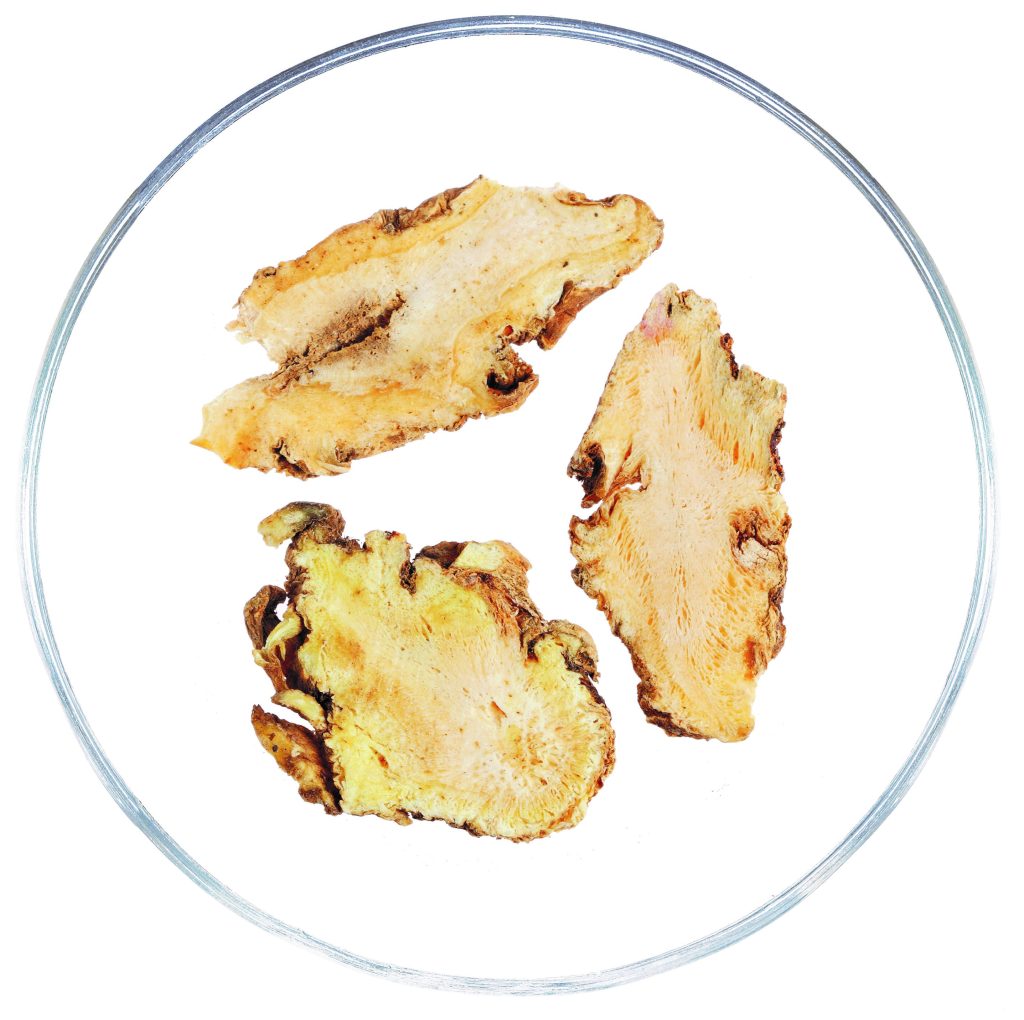Radix Angelica Pubescens (Du Huo)

What is Radix Angelica Pubescens (Du Huo)?
Radix Angelica Pubescens (du huo, 独活), also known as Doubletooth Pubescent Angelica Root, is derived from the dry roots of Angelica pubescens Maxim f. Biserrata Shan et Yuan, a plant in the Apiaceae family. First published in Classic of Materia Medica (Shen Nong Ben Cao Jing, 神农本草经), the roots of Du Huo are thick and short, slightly cylindrical, and it is said that Du Huo with a thick, oily and strong aroma is of the best quality.
In early spring, when the seedlings are just germinating, or in late autumn, when the stems and leaves have withered, people then dig the soil to remove the plant’s fibrous roots and sediments. Afterwards, the roots are baked till half-dry, piled up for two to three days till they become soft, and then dried completely for medicinal usage.
In Traditional Chinese Medicine (TCM), Du Huo falls under the category of ‘Herbs that dispel Wind and Dampness’. Such herbs can help to treat ‘bi (痹) pain’, which refers to painful obstruction in TCM, manifested as symptoms such as arthritic and rheumatic conditions with pain, stiffness and numbness of the bones, joints and muscles.
Warm in nature, Du Huo can help individuals with too much Cold in their body, such as those experiencing a Yin Excess or a Yang Deficiency, to restore a harmonious yin-yang balance. Bitter and pungent in taste, Du Huo can cleanse the body by clearing Heat, drying Dampness and promoting elimination via urination or bowel movements. Also, the herb may help to promote the circulations of qi and body fluids. In particular, Du Huo targets the bladder and the Kidneys.
Functions and Benefits of Radix Angelica Pubescens (Du Huo)
Traditional Chinese Medicine (TCM) shows that Radix Angelica Pubescens has the following health benefits.
Radix Angelica Pubescens can dispel Wind-Damp and alleviate arthralgia through its actions of dispersing, eliminating, warming and dredging. This herb is indicated for all kinds of arthralgia syndromes caused by Wind, Cold or Dampness, be it acute or chronic. Radix Angelica Pubescens is especially suitable in the treatment of pain in the lower portion of the body caused by Wind-Damp, such as pain in the waist and legs, paralysis and arthralgia of feet due to pathogenic Wind, Cold or Dampness.
With the actions of releasing the exterior and drying Dampness, Radix Angelica Pubescens can also treat exterior syndromes caused by Wind-Cold with Dampness. Radix Angelica Pubescens can treat symptoms such as headache, chills, fever, muscle aches and aversion to cold. In addition, Radix Angelica Pubescens is also indicated for dermal pruritus and toothache.
Adding Radix Angelica Pubescens to Dahurian Angelica Root and Figwort Root and sesame oil produces a mixture that can be applied externally to resolve Dampness, relieve pain and nourish yin after one’s anal abscess surgery as well. This can help the patient to recover from the surgery.
TCM records have stated that Radix Angelica Pubescens can treat diseases caused by Wind and Cold, pain caused by knife wounds, epilepsy, female uterine fibroid hernia, pain in the joints caused by Wind and evil spirits, spasms in limbs, headache, dizziness, pain in the waist and legs, sweating, flank pain, speechlessness, stiff hands and feet, skewness in the mouth and eyes, swollen eyes, skin itching, rheumatism and itching. According to Modern Practical Chinese Medicine, Radix Angelica Pubescens can induce sweating, promote urine discharge, and eliminate edema.

How to Use Radix Angelica Pubescens (Du Huo)
The recommended daily dosage of Radix Angelica Pubescens is 3 – 9g, when consumed as a decoction. For topical application, do consult your healthcare provider on the recommended amount for your condition.
Du Huo is widely used in Chinese herbal formulas such as Du Huo Cang Zhu Tang (独活苍术汤), which is used for lower back pain caused by Cold-Damp, and Du Huo Tang (独活汤), which is used for infantile paralysis and pain caused by chronic rheumatism.
You can find Du Huo and its supplements, such as pills, powder and decoction, in herbal stores and Asian specialty markets.
Cautions and Side Effects of Radix Angelica Pubescens (Du Huo)
Du Huo should not be used by individuals who are experiencing Yin Deficiency or Blood Deficiency with Heat signs, internal Wind, or pregnancy. As Du Huo has drying properties, it can injure one’s yin and body fluids.
Do note that the usage of Du Huo has been associated with photosensitivity at times, and overconsuming Du Huo may lead to side effects such as poisoning, with symptoms including tachypnea, agitation, hallucination, deliriums, and even paralysis.
If you are consuming anticoagulants such as heparin, warfarin and enoxaparin, or antiplatelet drugs such as clopidogrel, do not consume Du Huo with it concurrently. Concurrent use of Du Huo with these drugs may cause an additive or synergistic effect.
We strongly encourage you to consult your healthcare provider before deciding to add Radix Angelica Pubescens to your healthcare routine!
Summary
Here is a summary for Radix Angelica Pubescens (Du Huo):
- Herb name (Chinese): 独活
- Herb name (Pin Yin): dú huó
- Herb name (English): Doubletooth Pubescent Angelica Root
- Herb name (Botanical): Radix Angelicae Pubescentis
- Origin of species: Angelica pubescens Maxim. f. biserrata Shan et Yuan
- Part(s) of herb used: Root
- Geo-specific habitat(s): Sichuan, Hubei, Anhui
- Taste(s) & Properties: Pungent, bitter; Slightly warm; Administrates the Bladder and Kidney Meridians
- Actions: Relieves rheumatic pain or pain experienced in cold lower limbs
References
Chen, Y. F., Tsai, H. Y., & Wu, T. S. (1995). Anti-inflammatory and analgesic activities from roots of Angelica pubescens. Planta medica, 61(01), 2-8. [Accessed on 26th February 2023]
Yang, L., Hou, A., Wang, S., Zhang, J., Man, W., Guo, X., … & Wang, Q. (2020). A review of the botany, traditional use, phytochemistry, analytical methods, pharmacological effects, and toxicity of Angelicae pubescentis radix. Evidence-based Complementary and Alternative Medicine, 2020.[Accessed on 26th February 2023]
Share this article on
